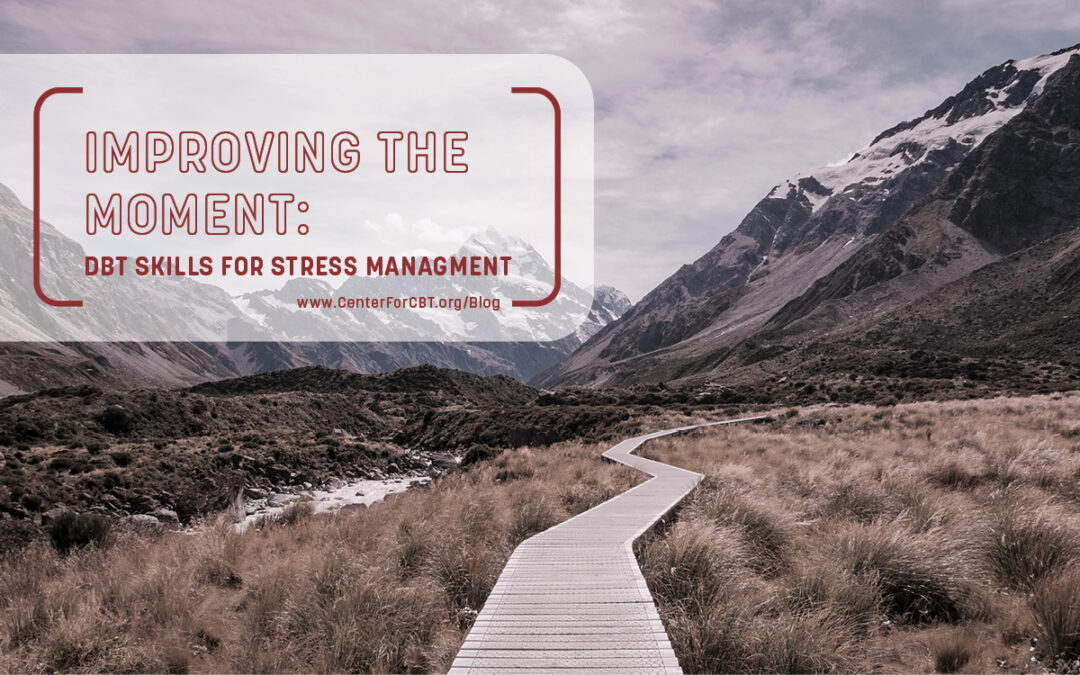There are events and moments in life that cause us distress, pain, or unpleasant emotions, and oftentimes it’s unrealistic or impossible to leave the situation or distressing event. As an adult this might look like a situation you cannot easily remove yourself from, like caring for an ill loved one or a poor performance review at work. For your teen, a family gathering or conflict with friends may trigger a similar type of discomfort. In these instances it is important to be adaptable, learning not only to tolerate a difficult situation, but to make it more positive. The DBT concept of improving the moment is a distress tolerance skill that involves changing the way you think about the situation or yourself, changing physical sensations of stress (e.g. practicing tension and relaxation techniques), and engaging your mind in an effective way.
When you’re feeling overwhelmed in response to a stressful situation or event that you cannot easily change, improving the moment will assist you in managing how you feel. By replacing unhealthy coping skills that could worsen an already difficult situation with the IMPROVE skills, you can help yourself better assess and address the challenges at hand. This skill is versatile in its application, allowing you to implement it in any setting without needing any tools other than your mind!
IMPROVE Strategies
Imagery. By using mental visualization, you can develop a different situation in your mind than the one you find yourself in. Envision a place that is peaceful, relaxing, and safe. This could be a place you have visited, or one created by your own imagination. For the greatest effect consider each of your senses as you develop the visualization. You might, for instance, envision yourself on an idyllic mountain retreat. To practice this technique, try imagining these details with your mind’s eye:
You can see a cascade of trees fading into the morning mist as you sit on the front porch of a rustic cabin. As you look out across the horizon, you feel a gentle breeze on your face and hear the sound of water rushing downstream, in harmony with the chorus of birds hidden among the trees. You can smell the earthy scent of the forest after it has rained, and you take a sip of your morning coffee to taste the rich and buttery notes.
Remember, whichever place you choose to devise in your mind’s eye, it is important that it be safe, secure, and relaxing. You can also imagine yourself coping well with the situation at hand, seeing yourself obtain your goal or visualizing a successful outcome.
Meaning. Although not always possible, finding or creating some purpose and value in the pain that you’re experiencing can help you endure your emotions and get through a difficult situation. The stressful job you lost? Now you can work to live a healthier lifestyle. The relationship that ended? Perhaps it’s an opportunity for greater self-awareness and reflection. In a difficult situation, try to remind yourself of what good can come of it. Remember, when one door closes, another one opens.
Prayer. Whether you consider yourself religious, spiritual, or follow a different belief system, you can ask for strength from your own divine being. This could be from a higher power, or even from yourself. You can access your wise mind to seek clarity in the moment and help yourself make effective decisions.
Relaxing Actions. Engage in an activity that you find calming and relaxing. This may take the form of self-care, such as a bubble bath or getting a massage, practicing a hobby, like yoga or meditation, or even simple skill building like deep breathing. Engaging in a mindfulness or relaxation activity will help you avoid ineffective or unhealthy behaviors and change how your body responds to stress.
One thing in the moment. Focus your entire attention on one thing in the current moment to allow yourself an opportunity for calm. Thinking about past or future suffering only increases distress and you can miss the positive or neutral nuances of the moment. For example, you may be at the park with your children or friends and find yourself ruminating over a significant conflict with your boss from that morning, or you may even be irritated by something small, like trash on the ground. If you’re focusing on these negatives, you may be missing the positives of the moment, like the pretty flowers, or your children’s laughter.
Vacation. Take a brief break from “adulting” even if it’s just for a few minutes each day! Allow yourself to stop dealing with the situation for a short period of time and focus on yourself. We all need time to regroup, so next time you’re feeling overwhelmed, try to unplug and read a book for an hour, get a coffee from your favorite café, or go for a walk and take the scenic route.
Encouragement. Break out those mental poms-poms and be your own cheerleader! Talk to yourself as you would talk to a loved one who was in crisis. Saying positive and encouraging things will increase your well-being. When you find yourself saying or thinking that “this will never end, I can’t deal with this, things will never get better” try to use more encouraging words, “I can stand it, it won’t last forever, I’m doing the best I can”.
Managing stress in difficult situations is a challenge in and of itself, but addressing it with healthy coping skills can help you better handle your struggles and improve the outcome. As is the case with all skills, you will have the best results if you practice this before you are under duress or in a crisis. This way, when you really need those skills, you will be able to remember and apply them more readily when needed. Life has its sour moments, and skills like IMPROVE give you the ingredients to turn lemons into lemonade.


